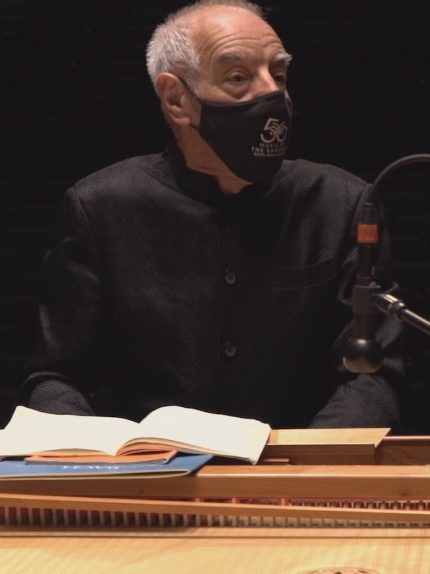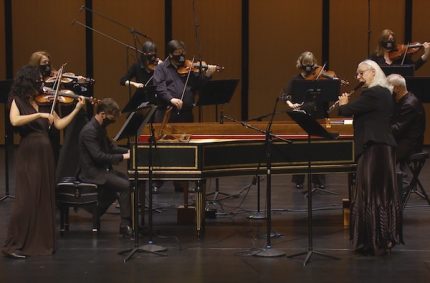Kraemer, MOB bring fresh vitality to Bach’s Brandenburgs

It has taken many qualities for an arts organization or small business to make it through the challenges of this Covid-19 year and the accompanying shutdowns. But perhaps none are more essential than flexibility and perseverance.
Music of the Baroque has keenly demonstrated both qualities throughout this historic 50th anniversary music season by moving their performances online and adapting their programs to evolving conditions. MOB’s creative leadership and artistic achievement were both recognized earlier this month when the Illinois Council of Orchestras named MOB chief Declan McGovern executive director of the year and Music of the Baroque professional orchestra of the year.
Last week Music of the Baroque was forced to alter its concert schedule for a fourth time, revising its June choral concert to a program of Bach cantatas. MOB has also confirmed that it will not be able to invite live audiences to its spring concerts, as was originally hoped.
The presentation and program details may have changed, yet the organization had soldiered on, presenting streaming monthly concerts since January.
On Monday night, Nicholas Kraemer returned to lead his first MOB concert since November 2019. Live-streamed from the Harris Theater, the concise program offered three of Bach’s Brandenburg Concertos. While the performances didn’t always evince the last degree of polish, the English principal guest conductor and MOB musicians showcased their ability to enliven even the most familiar repertoire.
The evening led off with Concerto No. 3. A bemasked Kraemer provided his inimitable droll introduction, noting that the first movement is the music one invariably encounters on the phone when placed on hold.
Conducting the ten players from the harpsichord, Kraemer set a brisk tempo for the opening movement, blowing off any sense of routine or voicemail associations. Concertmaster Gina DiBello proved an inspired leader in this stringiest of the set, leading with vital and incisive solo playing, albeit some occasional roughness from the backing ensemble. The Adagio from Bach’s Violin Sonata in G major stood in nicely for the missing middle movement, even if the duo of DiBello and Kraemer didn’t quite cohere. Still, the overall vitality won the day with an exuberant spin through the closing Allegro.
The Sixth Concerto served as the evening’s centerpiece. The earliest to be written, with its somber-stately expression and dark string coloring (two violas, two viola da gambas, cello and bass) the Sixth seems at times to emanate from English consort music of a century earlier.
The violas are primus inter pares here and Elizabeth Hagen and Terri van Valkingburgh brought worthy and largely polished advocacy to the shared spotlight. Their dusky, differentiated timbres proved complementary in the Adagio, nicely sustained at a spacious tempo with both players plumbing a depth of yearning expression.

The Concerto No. 5 closed the program and delivered the most all-around satisfying performance of the evening. In addition to providing some of the most relentlessly engaging music in his vast canon, the Fifth has a place in musical history—Bach essentially invented the piano concerto as a genre here, with the harpsichord player breaking into a brilliant and show-offy cadenza in the first movement.
Once again, Kraemer’s fleet tempo and punchy accents made things lively and kept the players on their toes. The camerawork was excellent throughout but proved especially impressive in the first movement, capturing the rapid back-and-forth between the leading violin, flute and harpsichord. Mark Shuldiner brought striking freshness and ad libitum spontaneity to the elaborate harpsichord solo.
The middle movement proved duly “Affetuoso” as marked, and rendered by DiBello, flutist Mary Stolper and Shuldiner with sensitive interplay and tender expressive poise. The concluding Allegro was ideally buoyant and offered a suitably joyful finale to the evening.
The Brandenburg Concerto stream will be available April 29-May 29.
Nicholas Kraemer leads Music of the Baroque’s next concert May 9. The streaming program offers concertos for four violins by Vivaldi and Telemann and concerto grossi by Handel and Locatelli. baroque.org
Posted in Performances




